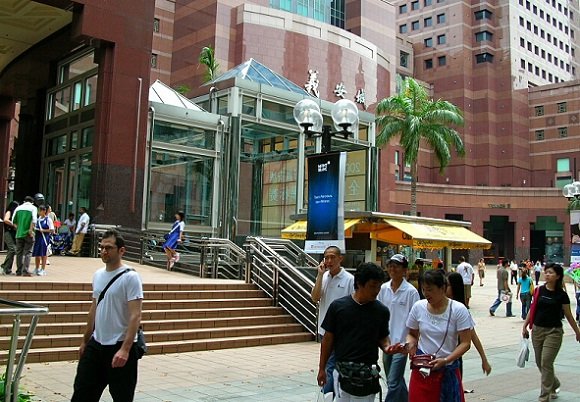Andrew J. Gawthorpe
The author is a media analyst and historian of U.S. foreign policy who has previously published on U.S. security policy in the Asia-Pacific.

Takashimaya Shopping Centre along Orchard Road
One of the paradoxes of modern political history is that even though sizeable middle-classes are associated with political stability, the process of their coming into being is often profoundly destabilizing. We need not resort to historical examples to prove this point, for we can witness its truth unfolding before our eyes in Egypt and China today.
In these countries rapid economic growth, the spread of new communication technologies and the frustration of demands for political empowerment have seen citizens taking to the highways and the information superhighway to vent their grievances and force change on their country’s political systems. The endurance of these systems will in turn depend on whether they are able to accommodate and co-opt these new political forces and create a new, wider social basis for stability which is responsive to the needs of newly-assertive middle-classes. Their alternative future is clear, for history is littered with defunct regimes that failed to rise to the challenge.
Meanwhile the developed world looks to be entering a period which will see not the further empowerment of the middle-class, but a prolonged period in which living standards will be eroded and economic opportunity curtailed. The west’s economic problems and ongoing financial crisis look unlikely to let up any time soon, and the Governor of the Bank of England’s warning that households face the biggest squeeze on living standards since the 1920s has wide applicability throughout the western world.
At the same time that China’s booming economy is bringing millions more Chinese into the middle-class, western families face inflation, rising tuition fees and the migration of skilled manual and white-collar jobs away from western countries to Asia. The result has been what Fareed Zakaria calls the “hollowing out” of the western middle-class.
The question hence arises as to what effect the divergent fortunes of the globe’s middle-classes will have on world politics in the coming decades. We know much more from history about the impact of rising middle-classes than we do about declining ones. Not everything that western political theory has had to say on the matter has been equally useful, however. During the 1960s it was common for modernization theorists to assert that economic development would increase the ranks of the urban middle-classes in developing countries, leading naturally to more open and democratic politics and peaceful integration into the global economy.
In this view, the middle-classes of the developing world were the rock on which the future would be built – and the future would be more prosperous, more rational, and more peaceful than the traditional societies which were swept away in the process. This simplistic view rightly came under attack for its belief that “all good things go together” and that development was a linear process which could not be reversed or develop unevenly, as we see for instance in authoritarian, capitalist China.
In contrast to the view that the advance of the middle-classes is a bedrock of stability, the reality has often been that the emergence of middle-classes in poorer countries has been destabilizing. Regimes which have had narrow social bases or bases among the peasantry can find themselves confronted by educated, assertive urban groups who demand a political voice commensurate with their economic position.
Furthermore, the support that such groups proffer to authoritarian regimes such as those in Beijing or Cairo is likely to be conditional on the state ensuring economic stability and the defence of the middle-classes’ economic position. If the regime is able to enlist the support of the middle-classes then they have a much greater chance at maintaining stability than if the middle-classes attempt to join with the poor to mobilize against the existing political system.
In terms of political stability, interrupted economic progress can often be worse than no economic progress at all, as burgeoning economic protest across China attests to. Similarly, the toppling of the Mubarak regime came not after a decade of economic stagnation but a decade of growth which raised the expectations and aspirations of Egyptian citizens, only to see them dashed by the financial crisis and the country’s rigid political system. If the middle-classes’ demand for respect and influence in the political system – which Francis Fukuyama (The End of History and the Last Man, New York: Free Press, 1992) identified as the engine by which liberal democracy would spread – is met by an increase in political openness, then all good things will indeed go together.
But if economic calamity or political stubbornness intervenes, frustrated middle-class citizens – with all the advantages and impatience that come with education, technology and organization – can be a source of grave political instability. The timidity with which Beijing’s rulers are cooling their patently overheating economy attests to this.
If the rapid process of social and economic change in the poorer global south makes the middle-classes a source of instability and possible dramatic political change, as in Egypt’s recent turmoil, the travails of the west’s middle-classes are more prosaic. Still vastly wealthier than their counterparts in poorer countries, the middle-classes of Europe and North America are already the bedrock of their country’s political systems.
In both Britain and America, even parties of the left are more likely to devote speeches to the challenges facing the squeezed middle than the truly impoverished. Cuts to government services disproportionately affect the truly poor, but it is the risk of falling out of the middle-class which keeps most Brits or Americans awake at night.
Facing what is likely to be a long period of inflation and debt, we can expect western middle-classes to elect politicians who will seek to defend their relative position and protect their jobs, their pensions, and their homes. While a dramatic economic collapse and subsequent political collapse into radicalism as affected parts of continental Europe in the 1930s seems unlikely, a long period of stagnation is virtually assured.
Western political systems are highly responsive to middle-class needs, meaning that these systems are likely to survive. Violent disturbances will likely remain limited to the truly dispossessed, as in London’s recent riots; the outraged response of politicians and the public to these events shows the system’s resiliency much more than their occurrence showed its weakness.
However, western government’s spending priorities are likely to dramatically change in the coming decades as they respond to middle-class demands to attempt to maintain living standards at home. International interventions will look increasingly hard to justify and be less possible regardless, as spending cuts erode the relative capabilities of western militaries.
A shrinking economic pie focuses minds on distributional questions at home, as is apparent in a country like Britain from the endless debates about issues such as bankers’ bonuses, taxes, and public-sector pensions which occupy the media and politicians. If the middle-classes in countries like China and Egypt are assertive and clamouring for more power, those in the developed world are defensive and attempting to safeguard what they already have.
The assertiveness of the new middle-classes in countries like China and Egypt is also likely to find expression in the international realm. The assertive nationalism of China’s middle-class netizens is well-known, as is skepticism within Egypt regarding the country’s long-standing peace treaty with Israel. In the face of economic calamity and the need to shore up political support, aggressive actions by regimes looking to channel anger and defuse social conflict cannot be ruled out.
Even if governments such as those in Beijing become truly responsive to the demands of their newly empowered and wealthy citizens, there is no guarantee that the result will be a more pacifistic policy – this is especially the case if accommodations made with the outside world come to be seen as a result of timidity, not fitting the country’s new wealth and capabilities. One sees signs of this now, for instance, in Chinese attitudes towards relations with the U.S.
Looking at the coming decades through the lens of the middle-class, we hence reach several conclusions.
The first is that while the western world is likely to turn inward as its middle-classes sullenly attempt to cope with the economic squeeze, the new middle-classes coming into being in the global south are less predictable and more likely to be a force for instability.
While still poorer than their western counterparts, urban, educated consumers in China and elsewhere emerged from the financial crisis on a better trajectory, and will look for governments who promote their interests at home and abroad; if they do not find them, they will be more willing than their counterparts in more developed and stable political systems to agitate for fundamental change.
Secondly, whether governments in the global south prove able to evolve to respond to the changing demands of their constituents and provide competent economic governance despite the unpredictability of the global economy will profoundly influence the future of these governments.
Thirdly and finally, this will go a large way to determining future questions of war and peace.
—

